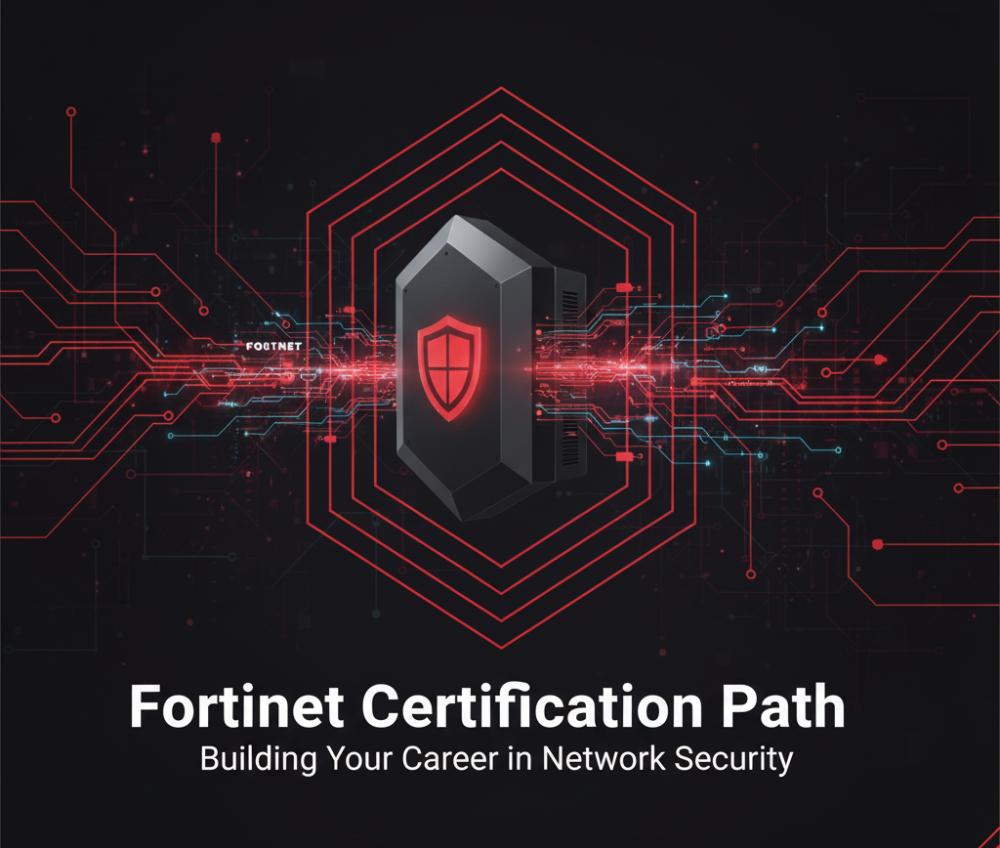
Fortinet Certification Path: Building Your Career in Network Security

In today’s fast-evolving cybersecurity landscape, professionals with the right technical credentials are in high demand. Among the top choices for those pursuing a career in network and data security, the Fortinet Certification Path stands out as a well-structured and globally recognized program. Designed for IT professionals, this certification path validates your ability to deploy, manage, and secure Fortinet’s advanced network solutions.
If you’re passionate about cybersecurity, understanding and following the Fortinet certification journey can be a game-changer for your career. With the rise of cyberattacks, businesses are actively searching for experts who can handle firewalls, threat management, and security infrastructure, all core areas where Fortinet specialists excel.
Why Choose Fortinet Certification?
Fortinet is one of the world’s leading cybersecurity companies, known for its flagship product, the FortiGate Firewall, and its robust Security Fabric ecosystem. The Fortinet Certification Path helps professionals validate their technical expertise across various Fortinet solutions, covering areas such as cloud security, secure access, and advanced threat protection. Getting certified demonstrates your ability to implement and manage real-world security architectures. It also gives you credibility in front of employers who prefer professionals with hands-on experience in network defense and system configuration. The demand for Fortinet-certified engineers continues to rise because of the brand’s dominance in enterprise-level network security.
Understanding the Fortinet Certification Path
The Fortinet NSE (Network Security Expert) program is at the core of the Fortinet Certification Path. It’s a tiered system consisting of multiple levels, each focusing on specific skill sets. These levels are designed to build upon one another, gradually enhancing your knowledge from fundamental security awareness to expert-level proficiency.
The certification path typically includes NSE 1 through NSE 8.
The foundational levels (NSE 1–3) are aimed at individuals who want to understand cybersecurity concepts, basic network operations, and the value of Fortinet products in securing enterprise environments. These are ideal for beginners or those transitioning from IT support into cybersecurity roles.
As you move up to NSE 4, you start to gain deeper insights into configuration, administration, and troubleshooting FortiGate firewalls. This is often considered a professional-level certification and one of the most respected Fortinet credentials. Beyond that, NSE 5–7 are for advanced professionals who want to specialize in areas such as FortiAnalyzer, FortiManager, FortiSIEM, and FortiClient EMS. These certifications prove your ability to manage complex enterprise networks and security infrastructures.
Finally, NSE 8 represents the pinnacle of Fortinet expertise. It’s intended for network security architects and seasoned professionals responsible for designing and implementing comprehensive security solutions.
Benefits of Following the Fortinet Certification Path
Choosing the Fortinet certification journey offers several advantages that go beyond just a credential. The program helps professionals build confidence in designing secure network infrastructures and protecting organizations from modern threats.
Employers across industries trust Fortinet-certified engineers because they demonstrate a practical understanding of Fortinet’s technologies and can deliver efficient, secure network solutions.
Additionally, certified individuals enjoy improved job opportunities, higher earning potential, and the ability to work with leading cybersecurity solutions. Many professionals also find that Fortinet certifications make them stand out when applying for roles such as Network Security Engineer, Firewall Administrator, SOC Analyst, or Cybersecurity Consultant. Fortinet certification also complements other major credentials like CISSP, CompTIA Security+, and Cisco CCNP Security, strengthening your overall cybersecurity portfolio.
How to Prepare for a Fortinet Certification
Preparing for a Fortinet certification requires dedication and a structured learning approach. Fortinet offers a range of official training programs through Fortinet Training Institute and FortiGate Labs, providing hands-on experience with real devices and network configurations.
In addition to Fortinet’s official resources, platforms like Cert Empire provide updated Fortinet exam dumps, practice tests, and detailed study materials that align with the latest NSE objectives. This combination of formal training and practical study resources ensures a comprehensive understanding of Fortinet systems and exam readiness. Practical exposure is crucial; working directly with FortiGate firewalls or FortiAnalyzer tools helps reinforce theoretical knowledge.
Career Opportunities After Fortinet Certification
Once you complete your Fortinet Certification Path, you can explore a range of cybersecurity roles across industries such as IT consulting, telecommunications, financial services, and government organizations. Certified professionals often work in roles that involve designing, implementing, and maintaining secure networks.
Positions like Security Engineer, Fortinet Specialist, Network Architect, and Security Operations Center (SOC) Analyst are commonly held by those with Fortinet certifications. The global recognition of Fortinet certifications also makes it easier to pursue international job opportunities. With the rise of remote work and cloud-based networks, professionals skilled in Fortinet products are essential for maintaining secure operations.
Stay tuned for more certification insights and exam preparation tips on Cert Empire’s Social Media.
Why Fortinet Skills Will Remain in Demand
Fortinet’s continued innovation in cloud security, AI-driven threat detection, and Zero Trust architecture ensures that its certifications remain highly relevant. As cyber threats become more sophisticated, companies are prioritizing security expertise that aligns with modern network defense strategies. Fortinet-certified professionals are particularly valuable for organizations using FortiOS, FortiAnalyzer, or FortiManager systems, as they can optimize security posture while maintaining system performance. Earning a Fortinet certification not only enhances your technical proficiency but also establishes you as a trusted cybersecurity expert capable of leading strategic defense initiatives.
The Future of the Fortinet Certification Path
Fortinet continues to refine its certification program to reflect emerging technologies and new security challenges. The introduction of Fortinet Certified Fundamentals (FCF) and Fortinet Certified Professional (FCP) under the new Fortinet Certification Framework signals an evolution in the learning experience. These certifications combine cloud security, endpoint protection, and operational technology (OT) into one comprehensive training model, giving professionals a 360-degree understanding of cybersecurity.
If you’re aiming for long-term career growth in cybersecurity, this is the best time to start your Fortinet journey.
In Summary
The Fortinet Certification Path offers an excellent opportunity to build a rewarding career in network security. It helps you gain both practical and theoretical knowledge, improve your job prospects, and stay ahead in the rapidly changing cybersecurity industry. Whether you’re starting with NSE 1 or aiming for NSE 8, your effort in mastering Fortinet technologies will pay off. Remember, consistent learning and real-world practice are the keys to success in this field.
Read More:
https://londonsecrets.icu/2025/10/21/certification-for-sap-the-key-to-advancing-your-it-career/
